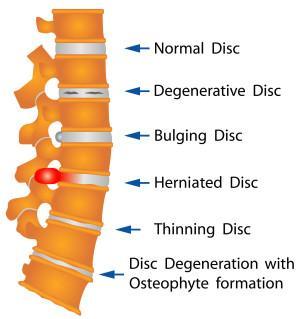Herniated and Bulging Discs
You’ve probably heard the terms bulging and herniated discs before, and while sometimes they are used interchangeably, they are actually two different conditions. That said, they both share a lot of similarities, so let’s take a look at the two conditions and how the pair are treated.

Similarities of Bulging & Herniated Discs
As you might imagine, both a bulging disc and a herniated disc affect the intervertebral discs in your spine. These spongy discs at as a shock absorber between your vertebrae, which contribute to your spine’s flexibility, which in turn helps protect the spine from injury. The discs are comprised of a gel-like center and a tough, fibrous outer layer. In the medical world, the center is known as the nucleus pulposus, while the outer layer is called the annulus fibrosus.
Both bulging discs and disc herniation involve nerve root irritation or impingement, which can cause similar symptoms, like radiating pain, numbness, muscle weakness, tingling sensations or difficulty walking. Both injuries also share similar causes, like:
- Poor posture
- Acute spinal injury
- Overstress/Repetitive spinal strain
- Normal wear and tear with age
Differences Between Herniated & Bulging Discs
The difference between the two conditions involves the gel-like center of the discs; the nucleus pulposus.
- Bulging Disc – In a bulging disc, there is no tear or rupture inside the outer layer of the disc. A small “bulge” protrudes into the spinal canal, but no portion of the nucleus pulposus has leaked out of the disc.
- Herniated Disc – A herniated disc involves a tear or a rupture inside the outer layer of the disc. This tear causes a portion of the gel-like nucleus to leak into the spinal canal. A herniated disc may have began as a bulging disc, but excess strain or pressure eventually led to a tear and disc herniation.
Not all discs are the same, and many of the treatments are used on a trial-and-see basis. Here are some treatment options for bulging and herniated discs.
Bulging Spinal Disc Treatment
- Avoid lifting and any other activities that could make symptoms worse or lead to herniation.
- Rest
- Weight loss and lifestyle changes
- Ice/Heat therapy
- Low impact exercises
- Stretching to relieve nerve pressure
- Targeted therapy with a physical therapist or spine specialist
- Over-the-counter pain medications
- Epidural steroid (cortisone) injections
- Surgery (Only needed in about 5-10 percent of cases)
Herniated Spinal Disc Treatment
- Rest
- Weight loss
- Physical therapy and gentle exercise to relieve nerve root pressure
- Chiropractic manipulation
- NSAIDs and other pain relievers
- Oral steroids
- Anti-inflammatory injections
- Surgery (Lumbar Decompression or a Microdiscectomy)
Spinal Surgeon
Dr. David Chang is recognized as a skilled spinal neurosurgeon. If you are experiencing back pain, contact Dr. Chang today to see if you are a good candidate for spine surgery.